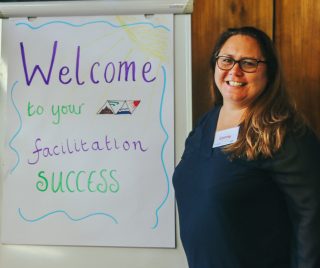Learning – Practice makes Perfect
by Conny Huaki, Aotearoa, New Zealand

When delivering any of the four TetraMap Nature Series range of workbooks the sensation of creating a positive learning experience for the participants is very fulfilling for any facilitator and requires a growth mindset.
TetraMap provides an extensive range of facilitator tools and resources to assist with designing a positive learning experiences which enables participants to grow, stretch and thrive in these challenging times. However the biggest resource and tool is you, the facilitator.
My practice has grown over the years, to assist me with achieving success with my participants my delivery approach includes three Māori practices āta, ako and aro.
“I am always learning.”
Michelangelo
Workshop Preparation:
Āta is a Māori value and cultural practice meaning to proceed slowly and with thoughtful deliberation (Taina Pohatu, 2004). For me this is the area that makes me really think about what I am doing, slowing things down to consider and be conscious of what learning is for both the participants and myself.
Examples include:
Atā Whakarongo (Listen) which is to consciously listen using all of my senses.
Whakarongo (listening) commences when I am approached or requested to facilitate a TetraMap workshop. This includes listening for feelings, unpacking the why, checking the expressions, statements and understanding for what is really required for the participants.
Atā Haere which is to be intentional in my approach moving with respect and integrity. Within my practice this includes ensuring I have appropriate learning outcomes to meet the learning required and a lesson plan to keep me on track.
Workshop Delivery:
Ako (Teach and learn) is a holistic concept that incorporates ways of knowing, knowledge systems, beliefs, values and practices that are strongly connected and related to concepts such as whanaungatanga, wairuatanga, manaakitanga, kaitiakitanga (Sciascia, 2017, p. 11)
Doing the TetraMap workshop and being aware of power imbalances, diverse backgrounds, learning strategies, resources and technology to meet the learning outcomes. This includes a plan a, b and c for dealing with.
Workshop Post Delivery:
Aro (Reflective Practice) is to reflect, focus, face-towards, pay attention to, consider or understand. Aro is a practice that allows the facilitator to take the time to self-reflect, debrief, assess the workshop, receive feedback and evaluate, which leads to modifications and/or changes in my delivery. When the aro is practiced and followed the results include taking up the challenge to learn and continuous improvement.
I also use karakia (prayer) and waiata (music) to strengthen and uplift the wairua (spirit) of the workshop. These actions bring ngā atua (ancestral gods) and my tūpuna (ancestors) into my delivery through the tunes, rhythms and vibrations create a safe environment for both the participants and myself.
My growth mindset beliefs such as I believe everyone wants to learn we just need to find a way that works for the participant or in other words the hook that awakens them.
This is why the TetraMap mantra “My Success Depends On Your Success” resonates with me.